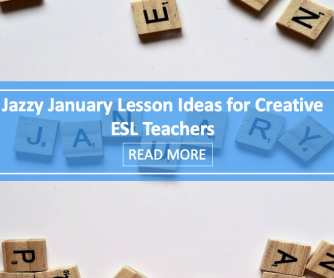
January is generally kind of a low point in the year for students because it follows a long school holiday. It is important to get students involved in fun activities and really engage them in lessons during this month. Doing different types of lessons and straying a bit from the textbook material every once in a while will force them to think on their feet.
Here are some lesson ideas for the month of January.
How To Proceed
-
1
Winter Vacation
Give students the opportunity to share what they did on winter vacation with the class. Design activities that allow them to either write a summary of their holiday to read aloud or answer interview questions with a partner or in a group. You can focus on like for your beginners using a structure similar to “I like to eat/make/play pie/cookies/games on Christmas.” For intermediate and advanced students you can focus on past tense, for example “I ate pie on Christmas.” or present perfect tense, “I have eaten pie every Christmas for 10 years.” You could also turn this into a simple game by creating Bingo sheets with Christmas themed pictures. Have students walk around the classroom asking and answering questions based on the pictures until a few students have gotten Bingo. If that is too easy, tell students that they must check off all the pictures to complete the activity. -
2
New Year’s
Since any cultural lessons in December would be focused on Christmas, take this opportunity to talk about how people around the world celebrate New Year’s Eve and New Year’s Day. Tell students some basic information about how three to five other countries celebrate New Year’s and have students compare these celebrations with how they celebrate the holiday. They can compare things such as what foods are traditionally eaten. Another thing you can do is talk about New Year’s resolutions and then have students make a list of two or three things that they would like to accomplish this year. If these resolutions are based on learning English, you can keep them on file to refer to later. If they are not, you can ask students to submit a copy of their answers anonymously and then in a later class tell them which resolutions were the most and least common. -
3
Conditionals
If the winter weather has gotten everyone down, have a lesson where students can dream up brighter alternatives. Have students practice conditionals by giving them sentence starters such as “If it were sunny, I would ~.” You can simply start the lesson with the first section of the example sentence and then call on students to get some different endings. Sometimes imagining things can be difficult for students but it is important to give them the opportunity to be creative. Some students really excel at this type of activity and will enjoy it immensely. Your sentence starters can become more and more outlandish as the lesson progresses. You could also have a worksheet with the first half of several sentences and ask students to fill in the second half of the sentences on their own. You could end the lesson with an activity where you give students the weirdest sentence starter yet and ask them to work in groups to finish the sentence and tell a little story. -
4
Discussion
For advanced classes you can have a discussion lesson about Martin Luther King Jr. whose birthday is celebrated towards the end of January. You can choose to talk about his life, how he is remembered, or both. Students may find this topic challenging so it is important to introduce some key vocabulary at the beginning of the lesson and prepare a short reading so that students will have some background on the topic before starting a discussion. Some schools prefer not to bring certain topics into the classroom so be sure that this material is acceptable before introducing it to your students. -
5
Letters
While a little unusual, the second week in January is Letter Writing Week so let students try composing letters in English. You can have students do this either in groups or individually. If you can arrange for them to have pen pals that would be great but if not, they can write letters to you, students in their class, students in other classes of yours, or as diary entries. It is important to talk about letter format before having them start this activity and devote some time to sharing letters with the class if appropriate at the end of the lesson.
Some creative January themes and topics this month will keep your class focused on their lessons and help students develop their critical thinking skills.
Do you have any other creative January lesson ideas? Please share!
P.S. If you enjoyed this article, please help spread it by clicking one of those sharing buttons below. And if you are interested in more, you should follow our Facebook page where we share more about creative, non-boring ways to teach English.








